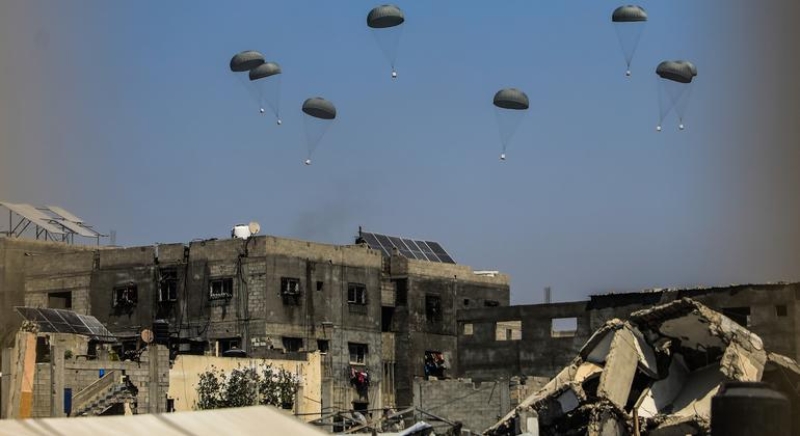- UN Urged to Tackle AI Bias Through Global Ethical Standards |
- US Firm to Build Bangladesh’s First Gigawatt Solar Hub |
- Joint Forces Recover 12,000 Cubic Feet of Stolen Stones in Sylhet |
- E-Return Filings Near 100,000 in First 10 Days of Tax Season |
- Fiji’s Truth Commission Seeks Healing After Decades of Turmoil |
Malnutrition Claims 100 Young Lives in Gaza, Says UNRWA

An airdrop of humanitarian aid targets northern Gaza in late July.
At least 100 children in Gaza have died from malnutrition and hunger, prompting humanitarians to stress the urgent need for faster medical evacuations from the enclave and greater access for food supplies.
These young deaths are “the latest in the war on children and childhood in Gaza,” Philippe Lazzarini, head of the UN Palestine refugee agency (UNRWA), said in a tweet on Wednesday.
The toll also includes some 40,000 boys and girls reported killed or injured due to bombardment and airstrikes, at least 17,000 unaccompanied and separated children, and one million deeply traumatised youngsters who are not receiving an education.
“Children are children,” he said. “No one should stay silent when children die, or are brutally deprived of a future, wherever these children are, including in Gaza.”
Thousands of sick children in Gaza need urgent medical evacuation, according to the UN aid coordination office OCHA.
Olga Cherevko, a spokesperson for the agency, recalled recognising a young girl in a Gaza hospital after a year’s absence — once again suffering from malnourishment.
“I remembered her long eyelashes,” the veteran humanitarian told UN News, describing seven-year-old Janah, whom she met at Gaza City’s Patient Friendly Hospital on Tuesday.
“The first time I met her was in the IMC Field Hospital in southern Gaza in April 2024. Back then, she was severely malnourished and was getting treatment. She gradually became better, was released, and went home.”
However, Janah is now back in hospital “because the malnutrition became aggravated, and the condition she has cannot be properly diagnosed.”
The girl is on a list of people awaiting medical evacuation for treatment outside Gaza. The most recent evacuations took place last week, when the World Health Organization (WHO) supported the transfer of 15 critically ill children to Jordan — but more than 14,800 people are still waiting.
Ms. Cherevko stressed the importance of continuing evacuations to save as many lives as possible.
She also noted that for children and adults with pre-existing conditions, malnutrition worsens their health.
“It wouldn’t be this way if they had proper nutrition, because these conditions existed before the starvation crisis and they weren’t getting as sick as they are now,” she said.
“This is why it’s imperative to ensure proper conditions on the ground for adequate supplies to enter — everything from food to medicine to nutrition to shelter,” she continued.
“These lifelines have to be truly enabled for us to deliver aid to those in need.”

